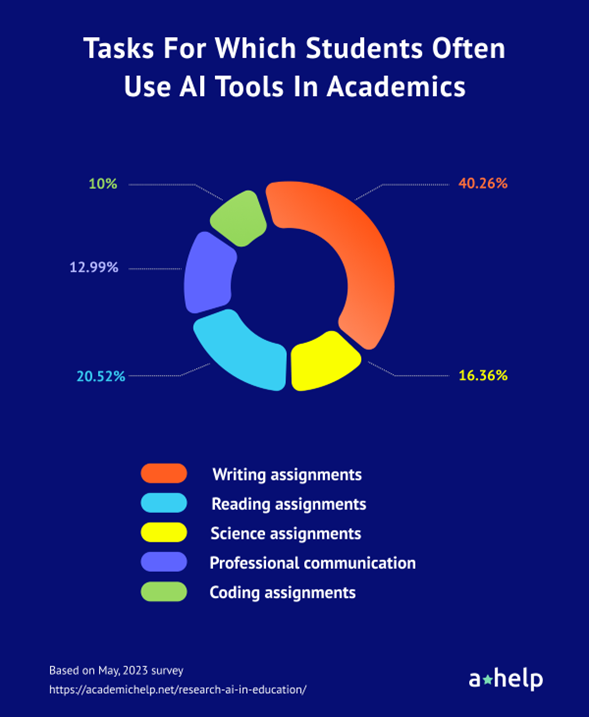AI text-generating tools have been put onto the test as a recent study reveals their true value and practical usage in the students’ studying process.
Artificial Intelligence (AI) is reportedly increasingly being adopted by educational institutions. In education, AI applications are intended to assist in learning, with AI text-generating tools becoming prevalent since the emergence of ChatGPT. These AI tools promise to summarize complex articles, generate insightful essay outlines, and potentially revolutionize the way students work with their academic assignments.
Yet, some questions arise: How aware are students of these AI tools? Do they know how to use them? How often do they use them? How effective or relevant are they to academic integrity, according to students’ views?
Over 80 percent of higher education students have reported they have tried Artificial Intelligence (AI) products for learning purposes, a recently conducted study revealed. According to AcademicHelp.net (A*Help), an online educational platform providing students and learners with various resources to aid their learning, it appears that, by and large, students are not as excited about using ChatGPT and other AI tools for cheating the system as many seem to believe when discussing AI for education.
A*Help’s comprehensive research on AI in academia from students’ perspectives reveals that 58 percent of students prefer to do assignments on their own, 36 percent do not trust the accuracy of AI tools, and only 8 to 10 percent said they would use AI for essay writing with most using it for other academic purposes. The results of the study are based on an A*Help survey with data collected between May 15, 2022 and May 30, 2023. A pool of 600 United States-based participants from 43 U.S. states took part in the survey. The study’s central aim was to evaluate the extent of AI tools’ integration in the student population.

Some of the most frequent problems that students encounter during academic writing include struggle to collect thoughts and start work (30.52 percent), difficulty in formulating an idea (24.14 percent), and locating relevant sources of information (22.28 percent). These issues typically arise during the early phases of academic writing. The data collected also reveals that a considerable number of participants encounter challenges in defining the thesis or main idea for their work. This could indicate insufficient understanding of the topic, lack of research, or weak critical thinking skills.
The survey indicates that despite a high awareness of AI tools among students there is a great spectrum in the frequency of usage. According to the report, the most commonly used AI tools include grammar checkers (81.17 percent), plagiarism checkers (71.33 percent), citation generators (67.50 percent), and AI text-generation tools (67.17 percent). AI text-generation tools such as ChatGPT are recognized and tested but are not regularly integrated into the students’ study routines as of the study period.
The most common tasks for which students more often use AI tools in academics which have proven to be beneficial include writing assignments, reading and science tasks, and some coding problems. AI tools for communication tasks such as writing emails and messages also made the cut as per students’ responses.
However, it seems like certain concerns and challenges remain to be addressed, including a 42.55 percent of school regulations restricting the use of such AI tools, a 36.64 percent of issues regarding accuracy, and a 22.46 percent showing lack of knowledge on how to employ AI tools effectively.
The study also highlighted students’ concerns on certain limitations they have found when using AI tools including poor fact-checking (31.21 percent), lack of citations (29.48 percent), and the absence of formatting in required academic styles, such as APA and MLA, in generated content (25.43 percent). This shows that students are wary of the accuracy and reliability of the information provided by these AI tools, which is an essential factor in the academic environment. For AI tools to become widely used by students with their academic tasks in a reliable manner there are several areas where they can still improve.
Although AI tools can be time-saving and helpful, there are still some concerns around academic integrity associated with AI text generation which indicate a need for better communication around their ethical use and potential improvement.
These findings highlight the need for educational institutions to help students with the use of AI tools and also provide more explicit guidelines on using them. In addition, educational institutions must work closely with developers to ensure their products better support and uphold academic integrity.
For more articles on AI, ChatGPT in higher education, see:
How to Integrate AI into Higher Education
Artificial Intelligence is The Future of Teaching and Learning
New Survey Finds AI is Replacing Tutors for Students
ChatGPT, Generative AI are Wake Up Calls for Higher Education